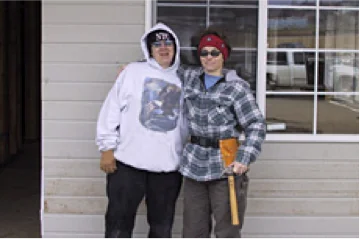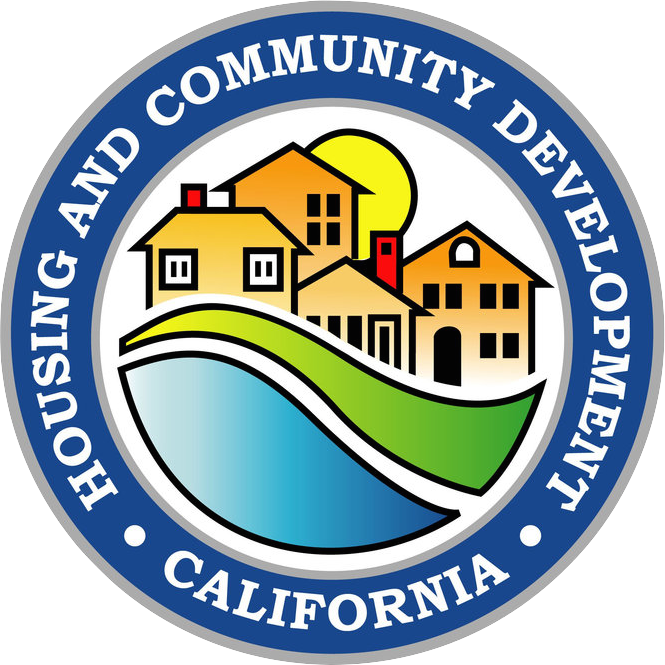Improve and Conserve the Existing Housing Stock
Conserve and improve the condition of the existing affordable housing stock, which may include addressing ways to mitigate the loss of dwelling units demolished by public or private action (Government Code Section 65583.(c)(4)).
Required Components of Programs

Effective programs reflect the results of the local housing need analyses, identification of available resources (including land and financing), and the mitigation of identified governmental and nongovernmental constraints. Programs consist of specific action steps the locality will take to implement its policies and achieve goals and objectives. Programs must include a specific timeframe for implementation, identify the agencies or officials responsible for implementation, and describe the jurisdiction’s specific role in implementation.
Program Requirements
Affordable housing is a valuable resource and the housing element must include programs to conserve and improve the existing housing stock. Improvement includes physical activities that upgrade the housing stock, such as rehabilitation. Conservation includes both maintenance activity (such as code enforcement in deteriorating buildings), improvements to the housing stock (such as weatherization programs that reduce housing costs), and other actions, policies, and programs that conserve the affordability of housing (such as a mobilehome park preservation ordinance). Policies and programs should be tailored to the results of the analyses and specific local situations.
Improvement
- Coordinate code enforcement. Code enforcement programs should be coordinated with utility, housing code inspection, and rehabilitation programs to effectively utilize funding resources, efficiently ensure safe homes, and avoid displacement.
- Create rehabilitation programs. Regularly seek funding or continue to fund existing repair and rehabilitation programs for ownership, rental and mobilehome parks. Funding resources may include Community Development Block Grants, HOME, etc.
- Maintain single-room occupancy units. Rehabilitate residential hotels for very low- and low-income households including people experiencing homelessness and those at-risk of homelessness.
- Create a “rehabilitation-fee amnesty” program. Provide interim fee relief for rehabilitation in targeted neighborhoods.
- Create targeted rehabilitation programs. Survey and designate neighborhoods and design a rehabilitation program to comprehensively address housing conditions.
- Leverage or create building-code enforcement programs. For example, the California Franchise Tax Board (FTB) operates the Substandard Housing Program, which assists the state and local agencies in addressing unsafe living conditions that violate health and safety codes. Because property owners who are in violation of health and safety code standards cannot make certain deductions on their personal tax returns, that additional revenue collected by FTB is transferred to the Local Code Enforcement Rehabilitation fund. These funds are then disbursed to the cities and counties that generated the notification of substandard housing to the FTB.
- Enable neighborhood revitalization. Designate lower-income neighborhoods for concentrated housing rehabilitation assistance through subsidized grants and/or deferred low-interest loans, public facility/infrastructure improvements through general fund capital improvement plans, special assessments districts, Mello-Roos community facilities districts, etc.
- Develop tool-lending programs. Facilitate ongoing rehabilitation and maintenance by developing “tools,” which may include actual tools and supplies, as well as instructions for simple upgrades or repairs (such as changing faucets or washers, heater screens, etc.).
Conservation
- Provide stable zoning to preserve affordable housing. For example, change the underlying zoning for a mobilehome park from commercial to mobilehome park.
- Require presale code inspections. Enact occupancy ordinances requiring presale code inspections and compliance before title to a property is transferred to new owners.
- Maintain long-term affordability restrictions on assisted rental units.
- Offer homeownership education and counseling. Establish pre- and post-purchase homeownership education and counseling to assist people in becoming homeowners and maintaining their homes. Programs can include creating referral centers, promoting toll-free hotlines, and doing outreach to ensure people are aware of the available resources.
- Facilitate rehabilitation by enforce building codes. Bringing older homes into compliance with current building codes can be costly, is not required, and can deter rehabilitation. Building code requires local government flexibility to facilitate rehabilitation while maintaining health and safety standards. To encourage rehabilitation, communities should conduct education programs for public officials, contractors, and property owners to ensure public knowledge of flexibility in building codes for rehabilitation (i.e. minor or moderate).
- Require replacement of lost housing units. Require one-to-one replacement of any housing units demolished due to public or private action.
- Enact demolition ordinances. Enact ordinances governing demolition of housing units and conversions of housing units to other uses (e.g. office or commercial).
- Adopt housing-element and code-enforcement policy. To ensure and promote compliance with health and safety code, when deciding whether to require vacation or repair of property, enforcement agencies must consider the needs expressed in a jurisdiction’s housing element.
- Conduct condition surveys. Conduct annual housing-condition surveys to determine the extent of rehabilitation needed and to prioritize rehabilitation programs.
- Enable neighborhood improvements. Establish and utilize Community Development Block Grant funds for a self-help, paint-up/fix-up neighborhood improvement program.
- Promote neighborhood clean-ups. Annually promote neighborhood clean-up weeks and activities.
Description of the specific actions, jurisdiction’s specific role in implementation and demonstration of commitment to implement
Objectives: (Quantified, where possible)
Responsible Agency:
Timeline:
Funding Source(s): (Where appropriate)
Sample Program 1: Housing Rehabilitation Programs
The Housing Rehabilitation Program provides loans, and rebates to income-qualified households to correct health and safety code violations and make essential repairs. The maximum loan limit is $50,000 with a minimum equity requirement of 10 percent. The Housing Rehabilitation Program is available to lower-income households (<80 percent area median income) and has the following components:
- 0% Interest Deferred Payment Loans for Basic Home Repairs: Principal-only loans secured by deeds of trust with no interest charged and no payments for at least five years. The minimum loan amount is $1,000 and after five years the borrower’s eligibility is re-evaluated to determine if a repayment plan should be established. A loan becomes due in full when there is a change in ownership (e.g. death, sale, etc.).
- Non-Repayable Lead-Based Paint Remediation Grants: Grants offered to pay the costs of lead-based paint identification and removal. The amount cannot exceed the costs of the approved non-lead related housing rehabilitation work. The grant does not require repayment by the recipient.
In addition, the city will explore the potential to implement a loan program for accessory dwelling units. This program will allow eligible homeowners to obtain a loan from the city to construct a small second-unit on their property, under the city’s existing accessory dwelling unit provisions.
Objectives: Provide 20 rehabilitation loans or grants annually. Explore potential for accessory dwelling loan program by the end of FY 2018-2019. Evaluate program through the Housing Element Annual Report process.
Responsible Agency: Community Development Department
Funding Source(s): Community Development Block Grant and HOME funds
Sample Program 2: Single-Family Housing Acquisition and Rehabilitation
This program utilizes HOME funds to enable lower-income households (up to 80 percent of area median income) to purchase their first homes. The city will select a nonprofit by January 2018 to acquire and rehabilitate deteriorated single-family homes. Assistance will be provided in the form of a loan secured by a deed of trust. The rehabilitated homes will then be sold to income-qualified first-time homebuyers. A potential source of housing for this program will be CalTrans excess right-of-way programs. The city housing department will initiate discussions with CalTrans on how to access and purchase excess units.
Objectives: 100 units over the planning period. Acquire and rehabilitate five, single-family homes within the five-year period through CalTrans. Continue to evaluate potential program options and the suitability of this program in a higher cost market like the city is currently experiencing. Provide ongoing assistance and evaluate program through the Housing Element Annual Report process.
Responsible Agency: Community Development Department
Timeline: Ongoing loans and initiate discussion with CalTrans by December 2018
Funding Source(s): HOME
Sample Program 3: Multifamily Housing Acquisition and Rehabilitation
The Comprehensive Neighborhood Revitalization Strategy includes acquisition and rehabilitation of deteriorated multifamily housing developments, with the goal of generating privately initiated improvements in some of the other complexes in the neighborhood. Under this program, the city will develop a list of nonprofit developers and send them a meeting invitation to discuss the city’s objectives and resources. The city will then select a nonprofit developer to purchase a deteriorated multifamily, rental property. The property will then be rehabilitated, with the options to combine some of the smaller units into larger family units. Relocation assistance will be provided to existing tenants who have to be temporarily or permanently relocated.
Objectives: Support the rehabilitation and revitalization of at least two properties or 100 units in the planning period. Provide ongoing assistance and evaluate program through the Housing Element Annual Report process.
Responsible Agency: Community Development Department
Timeline: Develop list of nonprofit developers by December 2018 and select a developer by June 2019.
Funding Source(s): Local Funds
Sample Program 4: Code Enforcement Program
Develop and maintain a multidisciplinary code enforcement program to ensure building safety of residential neighborhoods through enforcement of building codes on a compliance and building-permit issuance basis. Establish a coordination task force including housing, building, housing finance agency, planning, utilities, police, fire, waste management, and other public safety agencies to do cross-referrals and joint neighborhood projects. Create a brochure to provide information about rehabilitation loans and housing assistance programs for use by property owners who are cited and tenants in need.
Objective: Promote maintenance of existing housing stock and protection of existing tenants and lower-income households
Responsible Agency: Building and Housing departments
Timeline: Establish task force by June 2019. Create brochure by December 2019 and provide information as part of ongoing code enforcement activities
Funding Source(s): Community Development Block Grants
Sample Program 5: Mobilehome Park Preservation Program
The city will continue to implement the Residential Mobilehome Park zoning ordinance that sets conditions on changes of use or conversions of mobilehome parks. The city will also assist lower-income residents to research the financial feasibility of purchasing their mobilehome parks to maintain the rents at affordable levels. Where appropriate, assist the park residents or nonprofit to purchase the park to maintain affordability.
Objective: Continue to regulate the conversion of mobilehome parks.
Responsible Agency: Planning Division
Timeline: Inventory mobilehome parks and provide information to mobilehome park residents regarding potential resident purchase of parks and assistance available by June 2009. Evaluate and determine feasibility of assisting park residents in purchasing a mobilehome park by December 2019. Apply for Mobilehome Park Resident Ownership Program funds by June 2020.
Funding Source(s): Housing Trust Fund, Mobilehome Park Resident Ownership Program
- Sample Rehabilitation Program (PDF) — South Lake Tahoe

